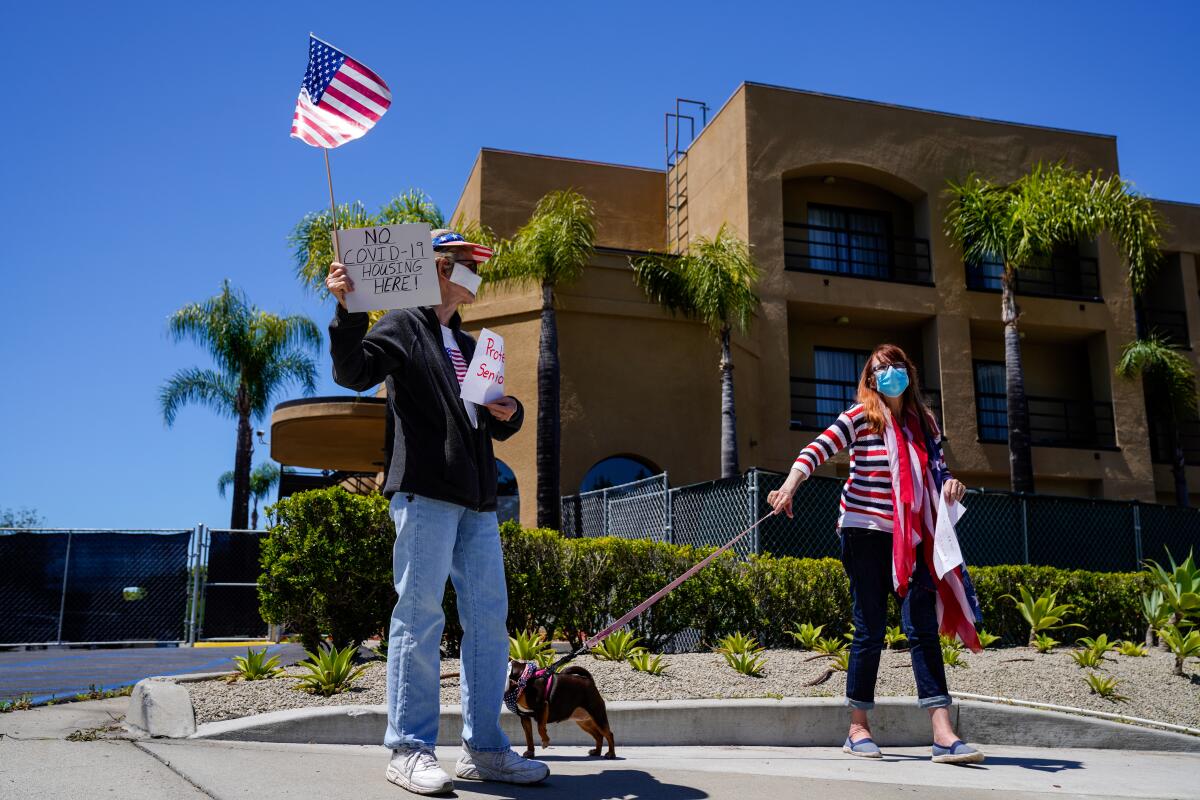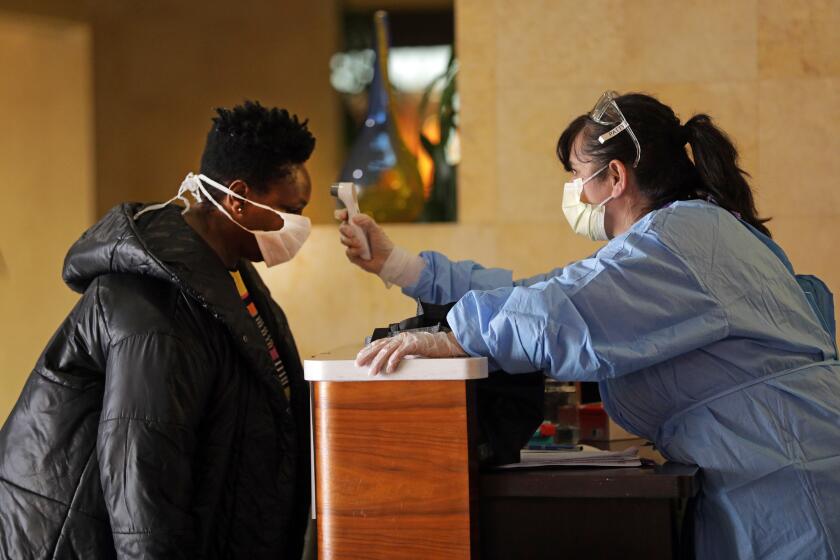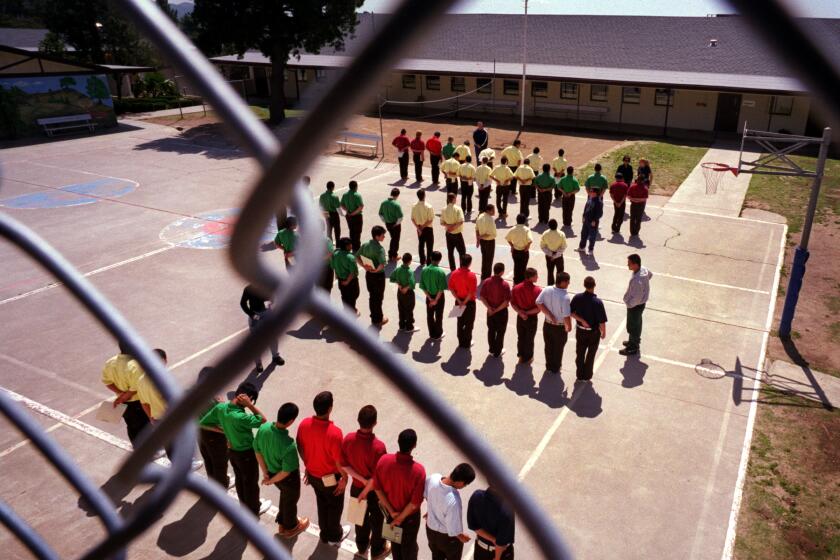O.C. pauses plan to use Laguna Hills hotel as homeless shelter amid coronavirus outbreak

Orange County will temporarily pause its plan to convert a 76-room hotel in Laguna Hills into temporary housing for homeless people amid the coronavirus pandemic.
The county brokered an agreement this month with Elite Hospitality Inc. to lease the Laguna Hills Inn for at least 90 days to shelter homeless individuals who are over 65, have underlying health conditions, are showing symptoms of COVID-19 or who have tested positive for the coronavirus. Officials had hoped to begin moving people in within the next several days.
In response, Laguna Hills — a city of roughly 31,000 people in the southern section of the county — filed a lawsuit against the hotel’s owner, the county and a nonprofit specializing in homeless outreach in an attempt to block the effort, alleging it would put the surrounding community at risk. The owners of four buildings adjacent to the hotel, who also oppose the plan, joined in the suit.
Attorneys representing the county made the offer to halt their efforts during a 90-minute Orange County Superior Court hearing held by phone on Thursday after Judge Thomas Delaney indicated he intended to grant Laguna Hills’ request to bar the county from using the site until a hearing next week.
During Thursday’s hearing, Delaney said he wasn’t swayed by the city’s argument that the county’s efforts would turn the building into a public nuisance. However, he said he needed more information from attorneys about whether the state’s order of emergency will allow the county to forgo restrictions outlined in the property’s covenants, conditions and restrictions, or CC&Rs.
He implored attorneys to work quickly, citing a shared need to protect all county residents from possible exposure to the virus.
“The court understands every day that someone cannot be admitted or allowed to shelter in the hotel creates a greater risk to the people in Orange County,” Delaney said.
City officials, who say they didn’t know about the county’s agreement until after it was signed, object to having sick and at-risk homeless patients so close to neighborhoods in their community. They contend the county’s plan would “present a high and unacceptable risk of propagation of the virus to the businesses and customers frequenting the area as well as nearby residential neighborhoods,” the lawsuit states.
County officials contend that without adequate shelter for homeless people the virus could easily begin spreading out of control.
City officials hope to secure 15,000 hotel rooms that have been idled by the stay-at-home orders to house at-risk homeless people.
Homeless people, who are more likely to have underlying health conditions and weakened immune systems, often from living on the streets, are at a higher risk for developing severe forms of COVID-19 than the general population, health experts say. With that in mind, officials across the state have been working on ways to quickly move people indoors amid fears that an outbreak in this vulnerable population could strain an already fragile health system.
Gov. Gavin Newsom has allocated $50 million to purchase or lease hotels and motels across the state for that purpose, along with an additional $100 million in emergency grants. The state has also provided trailers to Orange County to use in isolating homeless people.
Under its contract with the hotel, the county will pay $8,436 per day for use of the property, which will be managed by the homeless nonprofit Illumination Foundation. Those funds are expected to be reimbursed by the state, according to the document.
City leaders contend Laguna Hills —with a population including about 14% who are senior citizens and which borders the predominantly senior community of Laguna Woods — is not an appropriate place for such a facility.
As of Thursday, Laguna Hills had 13 of the county’s 1,425 confirmed coronavirus cases. During last year’s point-in-time count, the city had 24 unsheltered people living on its streets.
“Our city took this extreme action because we have been put in an extreme position by this project,” Laguna Hills Mayor Janine Heft said in a prepared statement. “It is horrifying to propose to place a substantial number of COVID-19 patients in the Laguna Hills and Laguna Woods vicinity, where there are over 20,000 of the persons most at-risk — seniors. We could not stand by and watch this happen.”
D. Kevin Dunn, one of the county’s attorneys, said during the hearing that the county has already started using hotels in other areas to house homeless people during the pandemic without issue. However, officials have received significant pushback when they’ve tried to set up a temporary shelter in the county’s southern section, he said.
Residents in Laguna Woods protested when it came to light earlier this month that the county had brokered an agreement with Ayres Hotel to use a property nearby for homeless housing and medical care. That deal quickly withered in the face of strident community opposition.
“Any location in the south county area will be deemed a horribly inappropriate location for this type of shelter,” Dunn said. “This is number two. Until this is required to happen, no city in south Orange County is going to allow this to occur.”
Shirley Raines straps on a bedazzled face mask, puts on gloves and drives to skid row to pass out virus-fighting essentials to the homeless community.
On April 7, a day after county officials announced the dissolution of the agreement in Laguna Woods, they signed a contract with Laguna Hills Inn. Laguna Hills officials responded by issuing a statement late last week saying they were exploring legal action to stop the plan.
A temporary shelter will be opened at Joplin Youth Center for homeless people who are older but not exhibiting any symptoms of COVID-19.
Kelly Richardson, an attorney representing the city and building owners, said while the county’s intention is a good one, he suspects officials did not think about the impact to the community before they entered into the agreement.
“Why in the name of all that’s reasonable would you transport a population of sick people into an area with healthy people, and not only healthy people, but people who are uniquely susceptible to the worst aspects of the disease? This is not to denigrate the need for transient people to get shelter and care. You just don’t do it in a way that puts people in jeopardy.”
More to Read
Sign up for Essential California
The most important California stories and recommendations in your inbox every morning.
You may occasionally receive promotional content from the Los Angeles Times.









